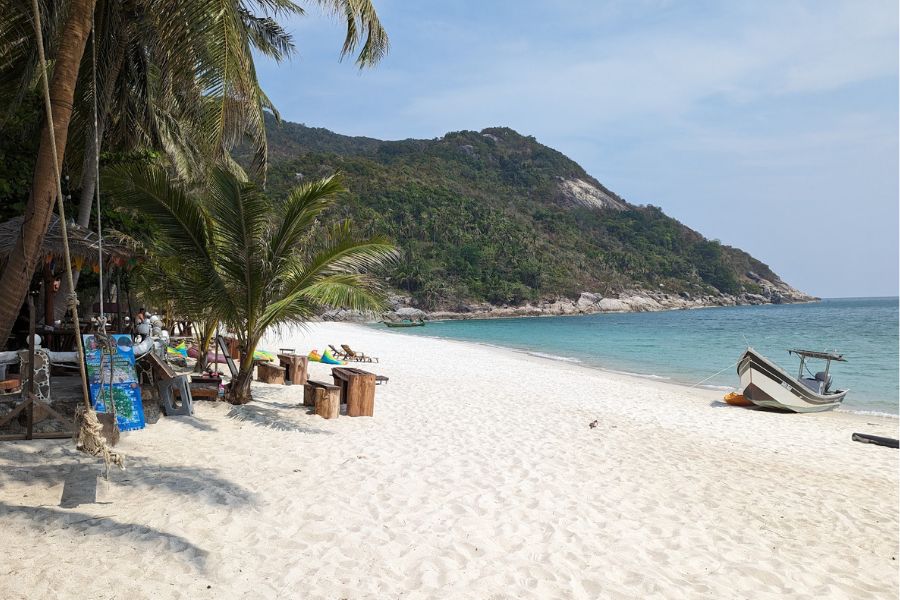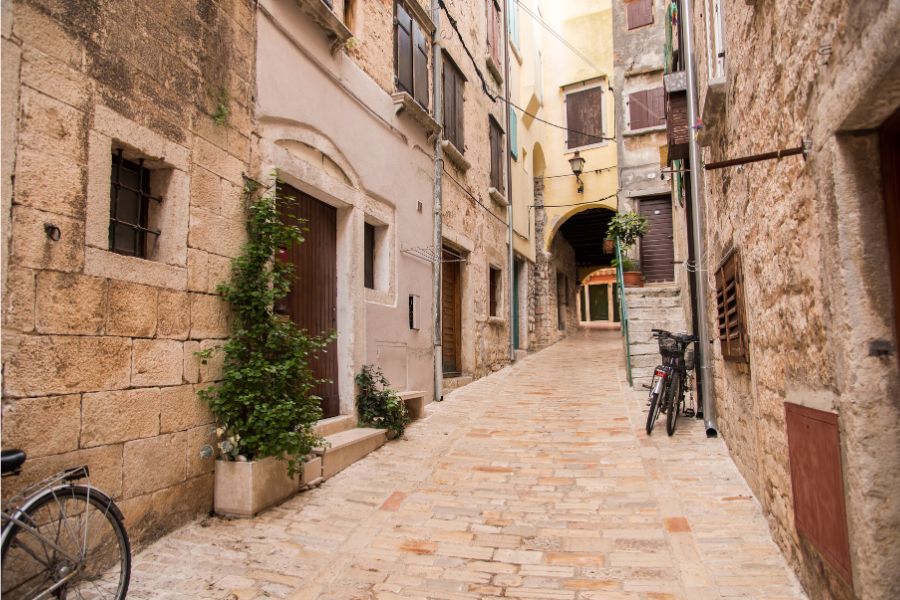For many travellers, the allure of a luxurious resort is undeniable. However, the hefty prices associated with high-end accommodations can frequently make such experiences out of reach. Fortunately, savvy vacationers know that there are alternatives that offer both affordability and quality.
Throughout my years of travel, I have learned the tricks of getting affordable luxury travel, which includes some stays at high-end resorts. Here are my top 5 tips.
1. Embrace Off-Peak Seasons
I’ve discovered that travelling during off-peak seasons is one of the best strategies for scoring great deals. By avoiding popular travel times such as holidays and peak summer months, I’ve often found significant discounts on accommodations. Whether it’s a beachside bungalow type house or a cozy mountain retreat, off-peak seasons offer an opportunity to experience destinations at a fraction of the cost. Plus, you get the bonus of fewer crowds and a more relaxed atmosphere.
One memorable trip was to the Italian Amalfi Coast in October. While summer is the prime time for tourists, fall offers mild weather and stunning landscapes without the swarms of people. I stayed in a charming bed and breakfast with breathtaking views of the Mediterranean for half the price it would have cost in July. The experience felt exclusive, with empty beaches and restaurants eager to provide excellent service to the few guests present. Wandering through the almost deserted streets of Positano and enjoying uninterrupted vistas of the coastline felt like having a private slice of paradise.
Another example is a ski trip I took to the Swiss Alps in early December, just before the holiday rush. By going slightly before the peak season, I enjoyed fresh snow and significantly cheaper rates. The slopes were delightfully quiet, allowing me to ski without long lift lines or crowded runs. Staying in a picturesque chalet, I had the luxury of a cozy fireplace and mountain views at a fraction of the usual cost. The local villages were serene, with festive decorations beginning to appear, adding a magical touch to the experience.
In Thailand, visiting during the shoulder season between the rainy season and the peak tourist season provided a fantastic blend of affordability and pleasant weather. I explored the stunning islands of Koh Samui and Koh Phangan in late September. The occasional rain showers were brief and refreshing, and the lower tourist numbers meant more personalized service and quieter beaches. I scored an incredible deal on a beachfront hotel, allowing me to wake up to the sound of waves without the usual crowds.

A beach without the crowds – Bottle Beach Koh Phangan, Thailand
2. Explore Hidden Gems
High-end resorts may dominate the travel landscape, but hidden gems abound if you know where to look. From cosy bed and breakfasts to lovely boutique hotels, countless accommodations offer comfort and charm without the hefty price tag. By venturing off the beaten path, I’ve discovered unique and affordable stays that provide a truly authentic experience. It’s amazing what you can find when you’re willing to explore a bit beyond the usual tourist spots.
In Croatia, I found a small family-run guesthouse in the town of Rovinj, away from the more commercialized areas like Dubrovnik and Split. This quaint coastal town offered a picturesque setting with cobblestone streets, colourful houses, and a vibrant local market. The guesthouse, tucked away in a quiet corner, provided a cosy room and warm hospitality, all for a fraction of the cost of a hotel in a more popular location. Exploring Rovinj felt like stepping back in time, with its old-world charm and unhurried pace.
For such travels, having a reliable credit card is essential, and that’s why I always carry my Wells Fargo Autograph Journey card. It ensures that I can enjoy my adventures with peace of mind, knowing I have financial support wherever I go.

Another hidden gem was a boutique hotel in Portugal’s Douro Valley. Known for its terraced vineyards and scenic river views, the region is less frequented by tourists compared to Lisbon or the Algarve. The hotel, a beautifully restored manor house, offered luxurious accommodations at a reasonable price. I spent my days touring local wineries, enjoying leisurely boat rides on the Douro River, and sampling delicious regional cuisine. The experience was incredibly enriching and far less crowded than the typical tourist hotspots.
In Japan, instead of staying in bustling Tokyo or Kyoto, I opted for a ryokan (traditional inn) in the town of Takayama. Nestled in the Japanese Alps, Takayama is known for its well-preserved Edo-period streets and rich cultural heritage. The ryokan offered tatami-mat rooms, onsen (hot springs), and kaiseki (multi-course meals), providing an immersive Japanese experience. The town itself was charming and tranquil, with fewer tourists and more opportunities to connect with the local culture.
3. Consider Alternative Accommodations
Traditional hotels and resorts are not the only options for savvy travellers. I’ve embraced alternative accommodations such as vacation rentals and hostels, which often provide more space and amenities than traditional hotel rooms at a lower cost. Whether it’s a cosy apartment in the heart of a bustling city or a rustic cabin in the woods, alternative accommodations offer flexibility and affordability for budget-conscious travellers. Plus, they often come with the bonus of feeling like a home away from home.
Vacation Rentals
One of my favourite alternatives to traditional hotels is vacation rentals. Platforms like Airbnb and Vrbo have opened up a world of possibilities, offering unique places to stay that suit a range of budgets and preferences.
For example, during a trip to Paris, I found a charming one-bedroom apartment in the Marais district through Airbnb. The apartment was tastefully decorated, had a fully equipped kitchen, and even included a small balcony with a view of the bustling street below. Staying in a local neighbourhood allowed me to experience Paris as a resident rather than a tourist. I could shop at the local markets, enjoy breakfast at nearby cafes, and explore hidden corners of the city that I might have missed if I were staying in a hotel.
In another instance, I booked a spacious houseboat in Amsterdam. This unique accommodation was docked in a quiet canal, offering a peaceful retreat after a day of sightseeing. The houseboat had all the amenities of a modern apartment, including a kitchen, living area, and even a small terrace where I could watch the world go by. The experience of staying on the water added an unforgettable element to my trip, all at a price comparable to a mid-range hotel room. For a similar mix of comfort and location, Outer Banks house rentals offer the perfect beachside escape, combining home-like amenities with direct access to the ocean.
House Swapping and House Sitting
House swapping and house sitting are other creative alternatives that can provide free or very low-cost accommodations.
I once participated in a house swap with a family in Melbourne, Australia. We exchanged homes for two weeks, allowing each other to explore new destinations without the cost of accommodation. Staying in their comfortable suburban home gave me a different perspective on Melbourne, beyond the typical tourist areas. I enjoyed the local cafes, and parks, and even celebrated Australia Day in the neighbourhood, making the experience feel like I was living there rather than just visiting.
Another time, I took up a non-simultaneous house swap opportunity in Lake Tahoe, USA. The exchange which lasted a week was booked for the start of April, I had looked forward to experiencing the beautiful lake and its surroundings, to my surprise we had a fresh dump of snow and the ski season was still ongoing. I had three wonderful days of skiing that came as a surprise.

Skiing Lake Tahoe
4. Take Advantage of Travel Rewards
Another secret weapon in my travel arsenal is the use of travel rewards programs. By signing up for credit cards with travel perks or loyalty programs with airlines and hotel chains, I’ve earned points and miles to use for free or discounted stays. With meticulous planning and strategic use of rewards, I’ve significantly reduced the cost of my accommodations. It’s like getting paid to travel—what’s not to love about that?
Credit Card Rewards
Credit cards with travel perks are a game-changer. By choosing cards that offer generous sign-up bonuses, earning miles or points becomes almost effortless. I’ve accumulated thousands of points by simply using my credit card for everyday purchases. For example, a few years ago, I signed up for a travel credit card that offered 50,000 bonus points after meeting a minimum spending requirement within the first three months. Those points translated into several free nights at a luxury hotel in Bali, making my dream vacation much more affordable.
Airline Loyalty Programs
Airline loyalty programs are another fantastic way to save on travel costs. By sticking to one or two preferred airlines, I’ve accumulated miles that can be redeemed for free flights, upgrades, or other travel-related expenses. For instance, on a trip to Japan, I used accumulated miles to book a business class ticket, enjoying a level of comfort and service that would have been prohibitively expensive otherwise.
Hotel Loyalty Programs
Hotel loyalty programs offer similar benefits. By signing up for programs like Marriott Bonvoy, Hilton Honors, or All Accor. With the last one I managed to accumulate so many points that with its regional Asia promotion, I had all sorts of hotels discounted in Bali that I managed to stay 2 weeks for an average of 25 euros a night. Some were of the 4-star option and some more budget options but all had a pool and were not too far from the beaches.
5. Plan Ahead for Deals and Discounts
Planning ahead is crucial for those looking to score deals and discounts on accommodations. I use sites like Google Flights or Secretflying to find good deals on flights or even error fares on flights. You would not believe it but I managed to get a deal back in 2018 via secretflying.com on a flight from Brussels to NYC with Air Canada for only 90 euros return. With error fares, this can happen.

New York in March – Cold but beautiful
Another trick I use a lot is to book hotels that have an option to cancel for free. This way when a better deal comes in I can cancel and go for the better alternative, for my next trip to Thailand I have already secured hotel accommodation for December which I booked in May.
6. Be Flexible and Open-Minded
Perhaps the most important secret of all is to be flexible and open-minded when it comes to travel. I’ve learned that sometimes the best deals are found when least expected. By being willing to adjust travel dates, destinations, and accommodation preferences, I’ve taken advantage of opportunities that arise unexpectedly. Whether it’s a last-minute deal or a spontaneous getaway, flexibility is key to unlocking affordable travel experiences.
Savvy vacationers understand that luxury doesn’t have to come with a hefty price tag. By embracing off-peak seasons, exploring hidden gems, considering alternative accommodations, taking advantage of travel rewards, planning for deals and discounts, and remaining flexible and open-minded, travellers can unlock affordable alternatives to high-end resorts. With careful planning and a bit of creativity, memorable travel experiences are within reach for budget-conscious adventurers everywhere.
I’ve had my fair share of splurges and budget trips, and I can honestly say that some of my most cherished travel memories come from those budget-friendly adventures. Whether it was stumbling upon a charming café in a quaint village or chatting with locals at a family-run guesthouse, these experiences have given me a deeper connection to the places I’ve visited.
And let’s not forget the fun of the hunt! There’s a certain thrill in finding that perfect little spot that offers everything you need without breaking the bank. It feels like you’ve unlocked a secret that only a few get to enjoy.


















